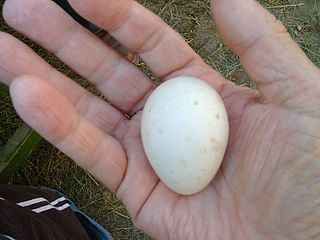
With so many different bird species on the planet, it’s a wonder that most people have only tasted one or two varieties of eggs.
In 2018, 157.6 million dozen chicken eggs were sold at retail, according to the American Egg Board.
So, it’s no secret, Americans love eggs, and if you’d like a profitable egg, you shouldn’t overlook Guinea Fowl eggs. Read on to learn more about the wacky loud-mouthed bird and how you can bring extra income to your farm.

What is a Guinea Fowl?
When you first see a Guinea Fowl, you’ll be amazed by their contrasting colors, wing-like wattles, and mime-ish makeup. These birds have character, and they do have a lot to say if they are displeased, which is also why they get a bit of a bad reputation.
Guinea fowl squawk and squeak to warn one other of impending doom, most typically a neighbor’s pug.
Guinea fowl are fantastic watchdogs, effective pest control, and functional egg layers, whether they’re dramatic or funny features or chalkboard-like screeching.
Let’s take a look at Guinea Fowl eggs and applaud this hardworking fowl for all of their effort.
What Do Guinea Fowl Eggs Look Like?

When it comes to color and form, Guinea fowl eggs resemble chicken eggs. The pointed end is pointier than the rounded end, and they’re smaller than a chicken egg in appearance.
Guinea eggs have blackish speckles on them and are brown to light brown in color.
You’ll probably have to hunt for the eggs of free-range guinea hens if you let them range freely. They prefer to nest them in a secluded location amid the weeds.
Don’t expect to find these nutritious nuggets in mid-winter because Guinea eggs are not available all year. Only a few times each year do these birds lay eggs, store up a clutch of eggs, and hatch their keets (baby guinea fowl) together.
It is not uncommon to see a couple of hens taking care of a large clutch of keets.
Guinea eggs are delicious in every sense of the word, and they’re loaded with flavor and texture!
Guinea eggs have a lot more yolk than egg white, and contrary to popular belief, they do not taste gamey. In comparison to a chicken egg, guinea eggs have much more yolk.
How Do Guinea Fowl Eggs Compare to Chicken Eggs?

Guinea fowl eggs are very similar to chicken eggs, but with a few differences: they don’t taste exactly the same.
1. Guinea Eggs are Richer and Creamier Than Chicken Eggs
Since the yolk to egg white ratio is greater in Guinea eggs, they are creamier than chicken eggs. Because the cooked product will undoubtedly be heavier than if there were less yolk, the yolks are the densest part of an egg.
2. Orange Yolk
Guinea fowl eggs are not always more orange than chicken eggs, however they often seem to be based on the way they are handled; nonetheless, this difference is a little deceptive.
The color of the yolks will be similar if you free-range or raise chickens side by side. In reality, a guinea fowl egg salad sandwich might be served to unsuspecting guests, and they probably wouldn’t realize it wasn’t made with chicken eggs.
4. Nutritional Value
Although nutritionally, two guinea eggs are superior to one grocery store chicken egg, the manner in which the hens are reared affects this. Because of their capacity to forage for high-protein foods like insects and grubs, Guinea eggs are incredibly rich in protein and have a little fat.
When it comes to nutritional value, it’s a horse race, but those who consume guinea eggs swear that they are tastier and creamier. These enhance the flavor by having a higher (healthy) fat level and a high protein level.
Where Can I Get Guinea Eggs?
Guinea eggs may be difficult to find depending on where you live. There may be laws prohibiting the ownership of these loud birds if you live in the city or a suburban neighborhood. It may be difficult to come across a neighbor who has eggs.
Your options for purchasing Guinea fowl will be limited to the people listed below if you don’t know anyone:
1. Farmer’s Markets
You can’t buy a dozen Guinea Fowl eggs at the local grocery store, as you might have predicted. If you’re looking for small farmers who raise these clownish birds, your best bet is to check out your local farmer’s markets.
2. Raise Your Own
I believe that if you’re interested in raising your own guinea hens, you’re reading this article. Fortunately, within a year of acquiring your hens (if you can locate the nest!), fresh eggs will arrive!
The laying season lasts longer in a warm, dry environment than in a cold environment because hens lay seasonally. Guinea fowl originate from Africa and prefer to live in warm climates, despite the fact that they can live in cold weather.
Making Money with Guinea Fowl Eggs
1. Farmer’s Markets
Guinea Fowl eggs are difficult to come by, so they command a high price at the farmer’s market. Selling your guineas’ eggs might be very profitable for you if you’re looking to make some more cha-ching from them.
2. Chicks
Other homesteaders may want to begin keeping Guinea Fowl and want to acquire hatchlings to rear, in the same way as you did with your endeavor.
3. Restaurants
Some people believe they are served as a delicacy, so contact eateries specializing in French on Oriental cuisine to get them directly.
What to Charge for Guinea Eggs
While fresh, free-range chicken eggs command a high price, rare Guinea eggs may cost significantly more.
A dozen farm-fresh chicken eggs will cost between $3 and $5 depending on your location.
Consider how rare Guinea eggs are, as well as the shortened laying season.
Oh, and the time you spent searching for their carefully hidden eggs.
With all things considered, using those very same selling traits–not to mention the creamy-delicious taste and texture–you may easily sell $1 per egg.
How Many Guinea Hens Should I Raise?
Depending on your local market, the number of chickens you should keep is determined. You can test the market with your family and friends since you have a small flock of Guinea fowl to begin with. If your eggs are a hit, they’ll be gone before you know it. Word of mouth travels fast.
Then sell your eggs at farmer’s markets, fairs, and flea markets around town.
You’ll be able to estimate how many hens you’ll need to supply demand once you’ve gotten a continuing clientele base. Remember that Guinea Hens don’t produce eggs all year. During the laying season, you may expect to collect around 100 eggs per hen.
What Permits and Licenses Do I Need To Sell Guinea Eggs?
The distribution of guinea eggs, like that of other items offered for human consumption, is controlled for consumer protection.
To make sure that you are abiding by rules, contact your county, state, and USDA. Selling your eggs legally may require a permit. lacked the necessary papers and was apprehended.
In order to sell your eggs legally, you must follow the regulations of each county and state. Without a license, some states allow you to sell eggs directly to the consumer.
When selling your eggs, please exercise extreme caution. For your money, and maybe your reputation, one wrong move can be a costly mistake.
You will be pleasantly surprised by the rich and creamy eggs of a Guinea Fowl flock if you are thinking of obtaining one just for pest control. The amount of money they can contribute to your homesteading business, on the other hand, is much more exciting.
You will be pleased with the rich, creamy eggs of Guinea Fowl fowl if you’re contemplating getting a flock for pest control. The amount of money they can bring to your homesteading operation, on the other hand, is much more exciting.
When it comes to the Guinea hen and their eggs, there’s more to it than meets the eye, and they’re definitely worth seeing!
